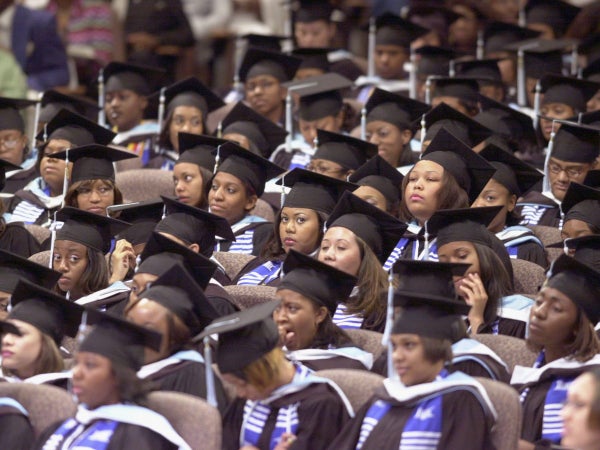 Commencement ceremony of the author’s alma mater, Spelman College. Photo by Erik S. Lesser/Getty Images. By Mary-Pat Hector ·August 13, 2021August 13, 2021
Commencement ceremony of the author’s alma mater, Spelman College. Photo by Erik S. Lesser/Getty Images. By Mary-Pat Hector ·August 13, 2021August 13, 2021
When I made the decision to attend Spelman College, I knew I was doing more than choosing school. I was making a choice to change the world. But what I did not know is that my choice to graduate from the top Historically Black College would leave me with $55,000 in student loan debt.
The US Senate just took the first step to consider a proposal from President Biden that would offer two years of tuition for free (or at a much more affordable price) at HBCUs and other Minority Serving colleges. This would require a historic $46 billion in new federal funding to help erase the state and philanthropic funding disparities HBCUs and their students face. In the next few weeks, Congress will decide whether future alumni end up with overwhelming student loans like me or an easier path towards starting a business, buying a home, or attending graduate school.
These issues are personal to me as a proud Spelman Alumna and a Director of the college affordability and youth-focused nonprofit, Rise. For me, it started with my Spelman education, a transformative experience. For the first time in my life, I learned and lived in an educational environment where I was not looked at differently because of my gender or my race. I stood on the shoulders of women like Rosalind Brewer, a Spelman alumna who became the first African American CEO of Walgreens and the first African American COO of Starbucks. I was encouraged to think outside the box like Alice Walker, another alumna who became the first African American woman to win the Pulitzer Prize for Fiction.
With these inspiring women in mind, as a sophomore, I became the youngest woman and person of color to run for office in Georgia history, narrowly losing by 22 votes. Today, I am one of many Spelman women who are working to change the world. But while we are fighting hard for progress, we are doing so weighed down by student loan debt that never seems to go away despite how many on-time payments we make.
While the experience of struggling to afford college makes you feel lonely, I know I’m not alone. More than 80% of Spelman students receive need-based financial aid; the same story is true for Black students seeking higher education at HBCUs across the country. Currently, Georgians collectively owe more than $60 billion in student loan debt. While Congress and the Biden Administration decide what to do about existing student loan debt, they can stop the bleeding by making college more affordable right now.
So far, much of the attention has focused on proposals for free community college. A national tuition-free community college would be a huge step forward for our nation and help address the sharp fall in community college enrollment during the pandemic. But Congress should also recognize that community colleges may not be the best choice for every student and the crucial role that HBCUs play in our community.
Today, HBCU graduates make up 80% of Black judges, half of Black lawyers and a quarter of STEM degrees. An HBCU graduate is currently the second most powerful elected official in the United States, Vice President Kamala Harris.
Despite their remarkable track record, HBCUs still receive far fewer resources to educate students than other colleges. That means that public HBCUs typically receive far less state funding than comparable universities, and private HBCUs rely much more on their students’ tuition to stay in operation. The disparity in funding makes HBCUs financially vulnerable and at risk of closure during tough economic times like the COVID-19 pandemic.
I believe that would change under the Biden plan, which would offer HBCU students two years free, or nearly so depending on the kind of college. By covering up to two years tuition, this plan would not only make it easier for students to afford HBCUs, but also help address campus hunger and homelessness that disproportionately affects Black students.
In short, the plan to make HBCUs more affordable would not only help produce more Black graduates, but also protect these vital institutions and promote local economies. Or in the words of President Biden that have gone viral: “Guess what? It grows the economy. Benefits everybody. Hurts nobody.”
So where does that leave the plan in Congress? The portion of President Biden’s plans that focus on families has faced near universal opposition from Republicans in Washington. Despite the potential for bipartisanship for investments in railroads and infrastructure, Republicans are opposing new investments in children, youth, and families. Some Republican members of Congress claim they’re too expensive, while others are continuing the same stonewalling tactics we saw during the Obama administration.
The good news is that Congress can pass the Biden plans for HBCU students and higher education under a budget process called reconciliation that only requires majority votes. The leader of the Senate kicked off the process last week with crucial votes to come in the weeks ahead.
If Democrats remain united and pass the plan, hundreds of thousands of students will benefit. Instead of experiencing hunger like I did in college, students at Spelman next year could have a better chance of focusing on their learning instead of their next meal. That would be a big win not just for HBCU students and alumni like me, but for our nation as a whole.
It would mean a new generation of changemakers who can focus more of their energy on making the world a better place, instead of struggling to figure out how to pay off student loans.
The post OP-ED: We Need to Make HBCUs Much More Affordable appeared first on Essence.

0 Commentaires